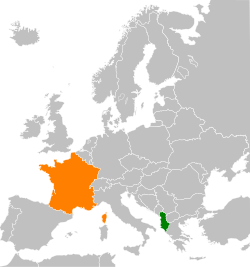
The Balkans, corresponding partially with the Balkan Peninsula, is a geographical area in southeastern Europe with various geographical and historical definitions. The region takes its name from the Balkan Mountains that stretch throughout the whole of Bulgaria. The Balkan Peninsula is bordered by the Adriatic Sea in the northwest, the Ionian Sea in the southwest, the Aegean Sea in the south, the Turkish straits in the east, and the Black Sea in the northeast. The northern border of the peninsula is variously defined. The highest point of the Balkans is Musala, 2,925 metres (9,596 ft), in the Rila mountain range, Bulgaria.

Enver Halil Hoxha was an Albanian politician who was dictator of Albania from 1944 until his death in 1985. He was First Secretary of the Party of Labour of Albania from 1941 until his death in 1985, a member of its Politburo, chairman of the Democratic Front of Albania, and commander-in-chief of the Albanian People's Army. He was the twenty-second prime minister of Albania from 1944 to 1954 and at various times was both foreign minister and defence minister of the country.
During classical antiquity, Albania was home to several Illyrian tribes such as the Ardiaei, Albanoi, Amantini, Enchele, Taulantii and many others, but also Thracian and Greek tribes, as well as several Greek colonies established on the Illyrian coast. In the 3rd century BC, the area was annexed by Rome and became part of the Roman provinces of Dalmatia, Macedonia and Moesia Superior. Afterwards, the territory remained under Roman and Byzantine control until the Slavic migrations of the 7th century. It was integrated into the Bulgarian Empire in the 9th century.
The foreign relations of Albania are its relations with other governments and peoples. Foreign relations are conducted through the Ministry of Foreign Affairs in Tirana. The current minister is Olta Xhaçka. The current Ambassador to the United Nations is Ferit Hoxha.
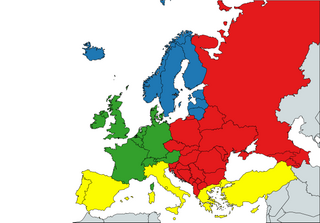
Europe, the westernmost portion of Eurasia, is often divided into regions and subregions based on geographical, cultural or historical factors. Since there is no universal agreement on Europe's regional composition, the placement of individual countries may vary based on criteria being used. For instance, the Balkans is a distinct geographical region within Europe but individual countries may alternatively be grouped into Southeastern Europe or Southern Europe.
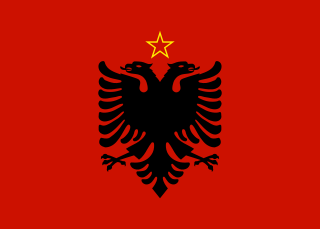
The People's Socialist Republic of Albania, officially the People's Republic of Albania from 1946 until 1976, was the one-party communist state in Albania from 1946 to 1991. It succeeded the Democratic Government of Albania (1944–1946).

Albania–United States relations are diplomatic relations between the Republic of Albania and the United States of America. Relations were first established in 1912, following Albania's independence from the Ottoman Empire, ending in 1939 due to German and Italian occupation in the Second World War, and re-established in 1991 after the fall of communism in Albania and the dissolution of the Soviet Union.
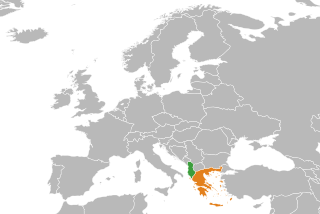
Due to the presence of Albanian immigrants in Greece and the Greek minority in Albania, historical and cultural ties as well as the frequent high-level contacts between the governments of Albania and Greece, the two countries today maintain excellent diplomatic relations.

The establishment of diplomatic relations between Albania and the Soviet Union happened on April 7, 1924. Both countries were also allies in the Warsaw Pact. Albania has an embassy in Moscow. Russia has an embassy in Tirana.

Greece and Italy enjoy special and very strong bilateral diplomatic relations. Modern diplomatic relations between the two countries were established right after Italy's unification, and are today regarded as cordial. The two states cooperate in fields of energy, security, culture and tourism, and are major trading partners, both in exports and imports. Greeks and Italians often exchange the phrase "una faccia, una razza", meaning "one face, one race".

Albania has an embassy in Ankara and a general consulate in Istanbul. Turkey has an embassy in Tirana. The most widespread religion in Albania is Islam (~59%), also in Turkey (~90%). Both are part of the Organisation of Islamic Cooperation (OIC). In addition, they are full members of the North Atlantic Treaty Organization (NATO) and Union for the Mediterranean (UfM). Turkey and Albania are candidates for accession in the European Union (EU).

Relations between Albania and Serbia have been complex and largely unfriendly due to a number of historical and political events.

Albania has an embassy in the Hague and the Netherlands has an embassy in Tirana.

Albania has an embassy in Rome and two general consulates in Bari and Milan. Italy has an embassy in Tirana and a general consulate in Vlorë.

Albania–Slovenia relations are diplomatic relations between the Republic of Albania and the Republic of Slovenia. Albania has an embassy in Ljubljana and Slovenia has an embassy in Tirana. Both countries established diplomatic relations on 9 March 1992.

Albania has an embassy in Berlin, a general consulate in Munich and 2 honorary consulates in Essen and Stuttgart. Germany has an embassy in Tirana.

Albania has an embassy in Budapest and Hungary has an embassy and a consular office in Tirana. The history of diplomatic relations of Albania and Hungary dates back to 1912, when Albania declared its independence on November 28, 1912.

Formal relations between Albania and Spain were established in 1986. Albania has an embassy in Madrid, and Spain has an embassy in Tirana.

Albania–Poland relations are diplomatic relations between the Republic of Albania and the Republic of Poland. Poland was the first Slavic nation to recognize Kosovo as an independent entity, the relationship between two nations is quite low than expected. Nonetheless, two countries have been working closer since the fall of communism at 1989 and there has been strong renewal of relationship between two nations.
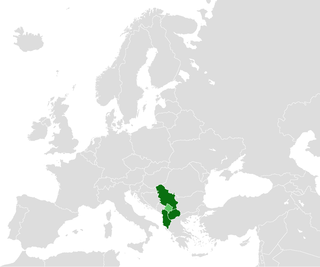
The Open Balkan is an economic and political initiative of three participating states in the Balkans, those being Albania, North Macedonia and Serbia. The initiative has a total area of 131,935 km2 (50,940 sq mi) and an estimated total population of almost 12 million located in Central and Southern Europe. The official languages are Albanian, Macedonian and Serbian. Its administrative centres are the cities of Belgrade, Skopje and Tirana. With the establishment of the initiative, all three member states aim to increase trade and cooperation as well as improve bilateral relations.
